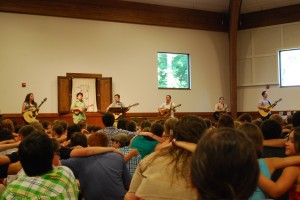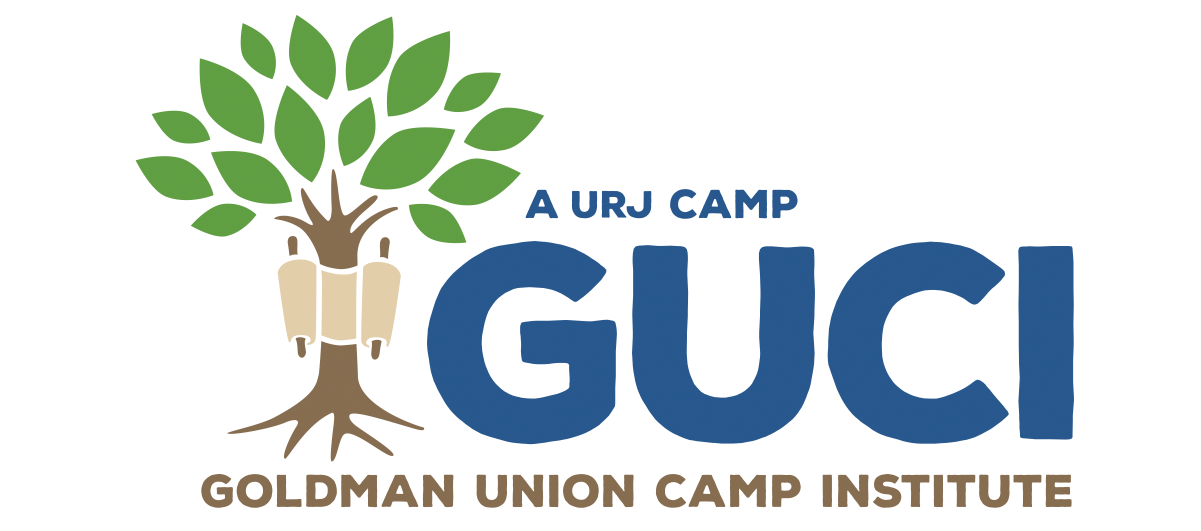
A Summer Shabbat for a Cold Winter’s Night
During these cold days of winter, here’s a reminder of the warm magic of GUCI, excerpted from a sermon by Stephen J. Werber, father of Rabbi Lauren Werber, a faculty member from Temple B’nai Abraham in Elyria, Ohio.
A short time ago my wife Joan and I decided to help out and drive to Zionsville, Indiana, to help my daughter, Rabbi Lauren Werber, bring our grandchildren Rachel, Sam, and Sarah home from GUCI, also known as Goldman Union Camp Institute. As one with great memories of Camp Airy those many years ago I had two motives: first, to help out and, second, to see what GUCI was all about.
Little did I know that doing this would involve temperatures of 104 and 105 without adding in the heat index and that the most important thing to bring, ear-plugs – never even came to mind. So from about 4:30 on Friday until Saturday evening, I got a snapshot of GUCI. That snapshot began during the Shabbat service. At some point during this service, as I was looking at some 300 campers from age 8 through those entering their senior years in high school, I turned to Joan and said “What I see is ‘hope.’” What I saw and heard showed that there is hope for the future of Reform Judaism. That hope grew with each passing hour.
Shabbat began with a gathering of the rabbinic “faculty” and other adults at the camp who were greeted by the Director, who used a shofar to announce the start of our Shabbat walk. We then marched through the entire camp, picking up groups of staff and campers with each hearing the sound of the shofar. We marched past the intimate outdoor and magnificent setting where the service was usually held. Out of deference to the heat we had the service in an air conditioned building, the Merkaz Tarboot – the Arts Center. This is a lovely building usually used for theater, dance and other activities. It has windows out of which you see trees and a small expanse of what has been given to us.
Everyone participated in this complete Friday night service. It is a tradition that one age group speaks to the evening’s theme. This time the theme was what made GUCI magical. It was presented by the youngest children. Between each prayer, two or three campers would read what they had written. Two children, remember these are eight and nine year olds being asked to use a microphone in front of over 400 people, were unable to do it. They just froze and tried to hold back their tears while counselors comforted them. When this happened the first time, all you heard was silence – it seemed interminable until, finally, the counselor read the words the child had written. Then the camp, in violation of a no applauding during services rule, spontaneously burst into applause.
When I was a camper a kid like that would have been teased all night. Instead, he was enveloped in love and respect. Human values, sure. But at GUCI these values are understood and applied. Later it happened to a girl. Somehow counselors had quietly reminded their campers of the rule. There was no clapping. Instead, we saw hundreds silently rubbing their hands together as a symbol of surrounding her with their warmth.
One of those young boys captured much of what GUCI represents. He said:
I am a first year camper , … I thought GUCI would be a regular camp. I was so wrong. The magic of camp is it turns a hardly Jewish kid like me into a person who knows a lot of stuff of Judaism in an extremely fun way. I thought I would be, well, weird and awkward and nobody would like me. In the last two weeks, I have done normal camp stuff and outstandingly fun stuff. I have always thought camp should be this fun. That’s the magic of GUCI.
That’s it. GUCI offers many of the same things as any camp: athletics, swimming in a fantastic pool complex, arts and crafts, theater, dance, but they also bring in daily study of our faith, emphasis on the values of Judaism and an appreciation ofIsrael. It truly is Judaism in a “fun way” that does not impede all the other things that make camp a great growing experience. After the service, despite the temperature, we proceeded to the dining hall.
When Joan and I went in we noticed an absence of campers. We soon learned why. The entrance rivaled the Grand March from Aida or the O.S.U. football team entry to the Horseshoe. Campers are welcomed in by the singing of Yis’m’chu, accompanied by clapping and banging on tables, as the counselors form a double line and the campers come through receiving high fives. It did not stop for over ten minutes until the last camper came in.
At various times the noise level was intense. When it was necessary to have quiet no one used a microphone or shouted for quiet. Staff members would raise three fingers to represent the shin. The response, every time, was almost immediate silence. I never before witnessed over 300 kids stop talking so fast. Their respect for those seeking silence was palpable.
The camp Director approached Lauren and asked if she and her family would lead the candle lighting and Kiddush. I am far from a deeply faith oriented person. It is rare for me to feel in awe of faith or God. Perhaps the first times that happened took place in my first visit to Jerusalem in 1997. As I looked out at these kids, with all of them from youngest to oldest participating, it happened again.
After dinner, with pretty good food, came singing. Not just singing. It was a song festival. It was enthusiastic, with jumping, dancing, and swaying with arms across shoulders. It was an experience not to be believed. These kids just did not stop celebrating with songs of prayer, joy, energy, friendship and fun. How they avoided heat stroke was something just short of a miracle. The songs ranged from Israeli melodies and prayer to more traditional camp like songs in an unending stream including L’cha Dodi and the Shehechyanu, all led by the young song leaders. I saw Rachel actively involved in ways I would never have anticipated, saw Sam being Sam, and Sarah quietly singing almost all of the Hebrew songs.
Following the song session, campers broke into their units for Israeli Folk dancing, and then the whole camp regrouped for a campfire. Due to the drought it was held indoors using a fireplace. Toward the end, the lights dimmed and a song began. It was an emotional time. This song led the campers to hold hands across row after row of them sitting on the floor. I was on a chair in the back of the room when a hand reached across and took mine. I do not know who it was, only that it was a twenty something or younger female. Her action reflected the spirit GUCI.
The next day, on Shabbat morning, there was another service. In many ways this service was similar to Friday night, but adding Torah readings from the scroll – read by campers and a d’var torah from a rabbi. The service was followed later that night by singing the top ten songs of the session as indicated by camper votes.
Earlier I mentioned that my snapshot of GUCI gave me hope. The kind of hope illustrated by Herman Wouk’s “The Hope” as he told the story of Israel from its statehood in 1948 through the 1967 six day war. Hope that Judaism remains alive and well, that its values of justice, learning, respect, dignity, friendship, love, loyalty, prayer, faith and the Hebrew language, will not “perish from the earth.”
That “hope” is the magic of GUCI.
